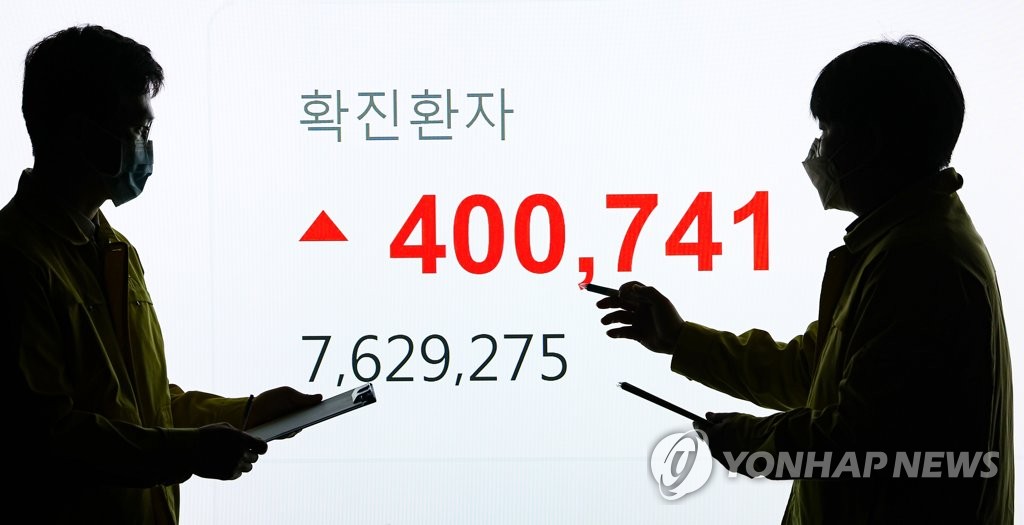- California Assembly OKs highest minimum wage in nation
- S. Korea unveils first graphic cigarette warnings
- US joins with South Korea, Japan in bid to deter North Korea
- LPGA golfer Chun In-gee finally back in action
- S. Korea won’t be top seed in final World Cup qualification round
- US men’s soccer misses 2nd straight Olympics
- US back on track in qualifying with 4-0 win over Guatemala
- High-intensity workout injuries spawn cottage industry
- CDC expands range of Zika mosquitoes into parts of Northeast
- Who knew? ‘The Walking Dead’ is helping families connect
S. Korea’s new COVID-19 cases surpass somber 400,000 milestone amid omicron wave
South Korea’s new COVID-19 cases hit yet another somber milestone of more than 400,000 on Wednesday, driven by the dominant omicron variant spreading at an overwhelming speed.
The country added 400,741 new daily COVID-19 infections, mostly locally transmitted, raising the total caseload to 7,629,275, the Korea Disease Control and Prevention Agency (KDCA) said.
It’s an all-time high since South Korea reported the first COVID-19 case on Jan. 20, 2020, and a big jump from Tuesday’s 362,338. The previous record high was 383,659 reported last Saturday.
The daily count differs from 441,423 reported by South Korean media last night quoting a private data tracker, as the number had not removed overlapping and erroneous data that appears to have been caused after the government began to allow virus tests conducted at local clinics as official results, the KDCA said.
The death toll from COVID-19 rose 164 to 11,052, with the fatality rate standing at 0.14 percent.
The number of critically ill patients, seen as a key indicator in the pandemic response, reached another record high of 1,244, up 48 from the previous day.
By 6 p.m. Wednesday, the country had reported 344,184 new cases, down 31,014 from a record 6 p.m. tally of 375,198 set the previous day.
Daily COVID-19 cases are counted until midnight and announced the following morning.
South Korea has seen its COVID-19 caseload spike since early this year, with the daily tallies surging from four digits to six digits in about three weeks last month.
Despite the fast spread of the omicron, the government has been trying to take steps to regain normalcy to the most possible extent while keeping up the fight against the virus.


Officials at the Songpa Ward in eastern Seoul go over the latest tally on daily COVID-19 infections, which hit an all-time high of over 400,000 on March 16, 2022, in this photo taken on the same day. (Yonhap)











